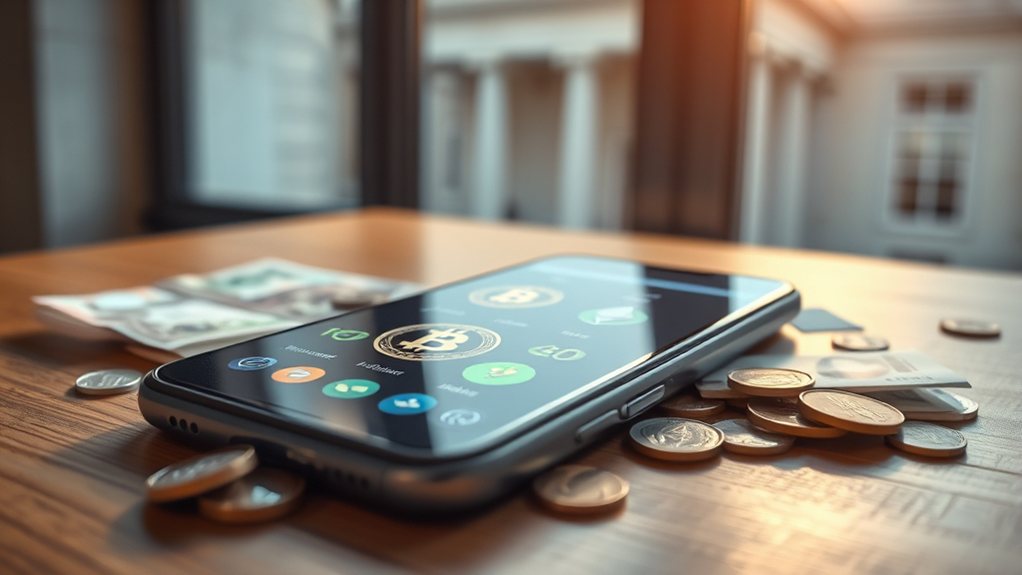Cryptocurrencies offer advantages like instant transfers and lower fees compared to traditional banks. They're available 24/7 and provide access to financial services for unbanked populations. However, crypto faces challenges including price volatility, regulatory uncertainty, and limited consumer protections. The financial landscape is evolving with banks offering crypto services and crypto platforms adding banking features. The future likely holds integration rather than replacement, giving consumers more options in a hybrid financial ecosystem.

As the digital economy expands, cryptocurrencies are challenging traditional banking in ways few could have imagined a decade ago. Bitcoin, Ethereum, and other digital currencies offer features that make traditional banks seem outdated.
Crypto transactions can happen almost instantly, even across borders. This speed contrasts with traditional bank transfers that often take days to clear, especially for international payments. Technologies like the Lightning Network enable Bitcoin to process transactions within seconds rather than minutes or hours.
Fees represent another area where crypto often outperforms banks. While banks charge substantial fees for services like wire transfers, crypto transactions typically cost less. This makes crypto attractive for people sending money to family in other countries. The savings on remittance fees can be significant, helping more money reach its intended recipient.
Crypto banking never closes. Unlike traditional banks with set business hours, crypto platforms operate 24/7. Users can send, receive, or trade at any time, even on holidays. This non-stop access gives users more control over their finances.
However, crypto faces serious challenges before it can replace traditional banking. Price volatility remains a major concern. The value of cryptocurrencies can change dramatically in short periods. This makes them risky for storing life savings or emergency funds. Traditional bank deposits, while offering lower returns, provide stability and often government insurance.
Regulatory uncertainty also slows crypto adoption. Different countries have different rules about cryptocurrency use. Some welcome it, while others restrict or ban it. This patchwork of regulations creates confusion for users and businesses. Banks, though heavily regulated, offer consistent rules and protections.
Security presents another challenge. While blockchain technology itself is secure, exchanges and wallets have been hacked. When this happens, users often have no way to recover their funds. The inherent decentralized structure of blockchain eliminates the need for intermediaries but also removes safety nets available with traditional financial institutions. Traditional banks, despite their flaws, offer fraud protection and dispute resolution services.
The landscape is evolving quickly. Some banks now offer crypto custody services. Crypto debit cards allow people to spend digital assets at regular stores. Meanwhile, central banks are developing their own digital currencies that could combine benefits of both systems.
Crypto has made significant progress in financial inclusion. People without access to traditional banking can use crypto with just a smartphone. This opens financial services to billions of previously unbanked individuals worldwide.
Whether crypto can fully replace traditional banking remains uncertain. What's clear is that both systems are learning from each other. Banks are becoming more digital and efficient. Crypto platforms are adding more traditional services and security features. Centralized Finance (CeFi) platforms are emerging as important bridges, providing familiar interfaces that help users access crypto services while maintaining some traditional banking conveniences.
The future likely involves a blend of both approaches, with consumers having more choices than ever before.
Frequently Asked Questions
How Secure Is Cryptocurrency Compared to Traditional Banking?
Cryptocurrency security offers strong encryption and decentralization but lacks traditional banking's consumer protections.
While crypto uses advanced methods like cold storage and multi-factor authentication, it's vulnerable to hacks, scams, and irreversible transactions.
Traditional banks provide FDIC insurance up to $250,000 and fraud protection systems.
Crypto's security ultimately depends on user practices and the specific platform's safeguards, while operating in a less regulated environment.
Which Cryptocurrencies Are Most Suitable for Daily Transactions?
Cryptocurrencies best suited for daily transactions need speed and low costs. Nano stands out with feeless transactions and 7,000 TPS.
XRP processes 1,500 TPS with minimal fees ($0.0013). Solana offers blazing speed at 65,000 TPS.
For merchant acceptance, Bitcoin leads with over 15,000 businesses worldwide, while Dash is accepted at nearly 5,000 merchants.
Litecoin combines moderate fees ($0.04) with acceptance at 2,230 businesses.
What Tax Implications Do I Face When Using Crypto?
Using cryptocurrency triggers various tax obligations.
Users face capital gains taxes when selling or trading crypto, with rates depending on holding time.
Mining, staking, and earning interest count as taxable income at the fair market value when received.
All crypto transactions require proper reporting on tax forms like 8949, Schedule D, and Schedule 1.
Failing to report can result in penalties.
Even crypto-to-crypto trades are considered taxable events by the IRS.
How Volatile Are Cryptocurrencies for Long-Term Savings?
Cryptocurrencies remain 3-4 times more volatile than stock markets, making them risky for long-term savings.
Bitcoin's price swings have decreased as the market matures but still exceed traditional assets like gold and bonds. Many financial experts suggest limiting crypto to 1-5% of a diversified portfolio.
Dollar-cost averaging can help manage this volatility.
Factors driving crypto's unpredictable nature include speculation, regulatory uncertainty, and limited market depth.
Can I Recover Lost Crypto if I Forget My Wallet Password?
Recovering crypto after forgetting a wallet password depends on the wallet type.
Most wallets offer recovery using a seed phrase – a list of 12-24 words created during setup. Without this phrase, recovery becomes difficult.
Hardware wallets have PIN codes with limited attempts before resetting.
Some specialized services can help with password recovery, but they're not guaranteed.
Prevention remains the safest approach.










